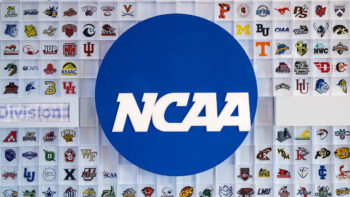 Many college athletes struggle with their mental and physical health throughout their collegiate career, and they deserve and need better mental health support around them.
Many college athletes struggle with their mental and physical health throughout their collegiate career, and they deserve and need better mental health support around them.
A college athlete playing sports seems like an ultimate dream for most; they get a free education, exposure of their talent, and even a shot to get to the pros and enter the draft to continue their journey. These athletes can even get NIL deals for more than seven figures, covering expenses that many college students could only dream of.
However, behind all these upsides is the reality of the college sports world: hard practices, full course loads and homework, traveling across the country, and the pressure from fans to perform your very best game in and game out.
According to a 2023 NCAA Student Well-Being Study, almost one in three college athletes are mentally exhausted most of the time, and only half are comfortable seeking help for their struggles when 70% of them reported knowing where to go for support or knowing someone who would be there for them.
These statistics uncover a hard truth in the sports world and how there has been a system built of performance over well-being for these poor college athletes who still have their education to chase. When these players feel like they are becoming anxious or depressed, many do not want to share these feelings for fear of being called ‘soft’ or being made fun of, or simply not being comfortable talking about it. The other half of athletes don’t even know where they could go for support or who to talk to about their struggles.
These problems became worse in the COVID pandemic when athletes were isolated and separated from teammates and coaches, and seasons started to be canceled while their scholarships and education were uncertain and not guaranteed during this time. Some schools and colleges tried to combat this during the time by adding psychologists or mandatory mental health check-ins for these athletes and students. However, most schools still treat mental health as optional and do not treat it as seriously as it needs to be taken.
These colleges spend hundreds of millions of dollars on new weight rooms, uniforms, recruiting, and so much more while the mental well-being of their players is at risk and could be declining while no one is there to support them or be there for them and one day this player and student could take their own life and make an even bigger issue and problem for the college and programs already have.
A healthy mind is just as important and serious for these students as a healthy body and mental health experts are just as important as strength coaches in these programs and colleges to help them not only stay healthy on the field and be the strong athlete they need to be, but also give them insight on mental issues and how to get through the ups and downs in life.
Stars of the game like Michael Phelps in swimming, Simone Biles in gymnastics, Naomi Osaka in tennis, and AJ Brown in American football are starting to speak out on these mental health issues and encourage and inspire so many more athletes to know that it is okay to suffer through these but you need to know that there is always help and support out there for you, you just need to make sure to find it.
Mental health is not a weakness in sports, it is a strength when everyone comes together and battles it as a team and it needs to be normalized in the sports world to give young athletes especially ones suffering with these issues inspiration to get through their struggles but also idols to look up to and realize that it is possible to battle and get out of their dark spots.
These campuses need to continue to add mental health support for their athletes, and every NCAA school should require a certified mental health counselor to be hired to help and talk to these students who work directly with teams and athletes. Coaches and other members of the team should also look out for signs of poor mental health in these athletes and make sure to check in with them before games and practices, and make it as big a routine as stretching before a game. If we expect and want these athletes to give their all on the field or court, they should have full support in the communities and schools to be there for them and be able to lean on someone in their life when they are struggling. Championships and winning games are a temporary thing and can be a great memory, but mental health and well-being are a lifetime struggle and should be prioritized in every sport, no matter what. Schools that value and prioritize mental health not only produce better athletes and teams, but they also produce better people in the long run.
I myself have struggled with mental health issues and depression as well, and these stories from athletes have
inspired me and encouraged me to keep going. The big thing to know is life will always keep going and I like to think of it as a roller coaster ride, you can be going up in life and everything can be feeling so good until you hit the top and things get rocky and it all comes crashing down so fast, but remember, there is always going to be another peak and climb to the top and no matter how far down or bad it gets, the climb back up will be even better and more exciting and worth the wait.
Your mental health matters, and even though I am not a star athlete or playing in the big leagues, I know how much these issues can affect you and how serious they need to be taken. If you or anyone you know is struggling with these issues, please reach out to someone for yourself and everyone around you. Everything can and will always get better, just believe in yourself and trust in the process. “Just Keep Swimming,” as Dory says.
“It’s okay to not be okay; it’s not okay to stay that way. It’s okay to ask for help. It’s okay to talk about your feelings … There is hope, even when your brain tells you there isn’t, just keep going, even on the hardest days” – Jayden “JJP” Park






Comments